A codependent person is someone who has let another person’s behavior affect him or her, and who is obsessed with controlling that person’s behavior.
Melody Beattie is the foremost American author on Co-Dependency and codependent relationships. She is a survivor of sexual abuse, abandonment, kidnapping, drug and alcohol addiction, loss of a child, and divorce. I have read a couple of her books and I find her writings to be practical as she knows what she is talking about. She has gone through the journey of codependency and navigating the roller-coaster of entanglement, enmeshment, and drama inherent in codependent relationships.
Her books include Codependent No More (1985–86), Beyond Codependency (1988–89), The Language of Letting Go (1990), The Codependents’ Guide to the Twelve Steps (1990), The New Codependency (2009).
Did you hear about the codependent wife? Each morning, she wakes her husband and asks him how she’s going to feel that day.
Book Themes
- Codependent No More (Beginning our Recovery) – Stopping the pain and gaining control of our lives.
- Beyond Codependency (Core Issues of recovery) – What to do when the pain has stopped and we’ve begun to suspect we have lives to live. It’s about what happens next. The books is about working on the nuts and bolts, and fine-tuning.
In her book, The New Codependency, Beattie shares her life story, the challenges, grief, trials, and tribulations that led her to explore the subject of codependency. She writes:
I’d started drinking at age twelve; using drugs by age eighteen, robbing drugstores, and shooting narcotics at twenty until I ran out of veins and ended up in treatment facing five years in jail by age twenty-four. I spent two years working hard to save my life by working a program of recovery and “clearing the wreckage of the past.” I worked, went to recovery meetings, made amends, and ate bologna sandwiches after going to the grocery store by bus. I had a lot of debts to pay off. Then I immediately got married and began having children.
My roles as a child and teenager were: alcoholic, student, and family member. Until I was twelve and turned my back on Him, I was a child of God. Part of my identity was being sickly. Four times in my life I became deathly ill; twice illness kept me home from school for a year each time. I didn’t have “friend” as a role. Friends weren’t allowed. I didn’t know how to socialize. I was also a musician, studying classical music for thirteen years.
From the age of eighteen to twenty-four, I had one role—junkie. Then I became a recovering person on a spiritual path, legal secretary, and student getting my chemical dependency counselor degree. The roles shifted when I became a counselor. Then I added wife and mother to my roles. I had a child when I was a practicing drug addict, but I gave up custody of him. I didn’t know how to compartmentalize that, so I filed it—and my first divorce—under “guilt.” The roles continued to shift. I became a reporter.
I had stopped almost all public speaking after my son Shane died in 1991 in a ski accident;
Writing Books on Codependency
I was absolutely obsessed with understanding codependency after it brought me to my knees. I went to recovery groups, but I wanted to know more. I wanted to know exactly what behaviors were involved, and what behaviors hurt the most. I wanted to understand why we did what we did, even though what we did didn’t work. I wanted to know how it affected this person, and that person—men and women, both. I wanted to hear people talk about why they did the codependent things they did.
I became so obsessed with codependency that I changed my vow to never write another book to I wasn’t going to write another book unless I had so much passion for the subject that I’d write it even if I was only going to make ten cents an hour. For five years, writing a book about codependency continued to be a goal. Every New Year’s Eve, I’d transfer it to my goal list for the coming year. People told me to forget it, just go to meetings like everyone else and stop trying to learn something I obviously didn’t need to know.
After being rejected by twenty publishers, one contracted with me to write the book. I was thrilled; I’d waited five years for this. A book is an ambitious project. Words don’t flow out of your fingertips. It took every ounce of my obsession and passion to get the job done. Obsession and passion are powerful fuels. Figure out what your obsession is telling you. If it’s unhealthy, do something that restores you to sanity and peace. If it’s a healthy obsession—ride that wave of passion until you reach your goal.
A book is an ambitious project. Words don’t flow out of your fingertips. It took every ounce of my obsession and passion to get the job done.
Codependent No More
Co-Dependent No More was originally rejected by twenty publishers (“Nice idea,” they said, “but there aren’t enough codependents to make publishing the manuscript worthwhile”), Codependent No More—strictly by word of mouth—became a best-seller. It hit the lists and is still a back-list best-seller. (The New Codependency, 2009).
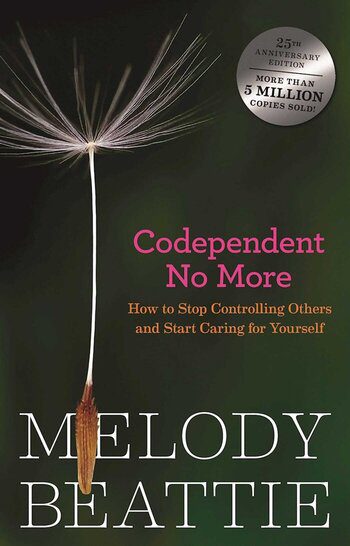
What is Codependency?
A codependent person is someone who has let another person’s behavior affect him or her, and who is obsessed with controlling that person’s behavior. Codependency is about normal behaviors taken too far. It’s about crossing lines. (Melody Beattie, Codependent No More, 1986)
Codependency is about normal behaviors taken too far. It’s about crossing lines.
Characteristics of a Codependent Relationship
In her book, Codependent No More: How to Stop Controlling Others and Start Caring for Yourself, Melody Beattie listed the following characteristics exhibited in co-dependent relationships:
Codependents are Reactionaries.
They overreact. They under-react. But rarely do they act. They react to the problems, pains, lives, and behaviors of others. They react to their own problems, pains, and behaviors. Many codependent reactions are reactions to stress and uncertainty of living or growing up with alcoholism and other problems. It is normal to react to stress. It is not necessarily abnormal, but it is heroic and life-saving to learn how to not react and to act in more healthy ways. Most of us, however, need help to learn to do that.
CARETAKING
Codependents may: think and feel responsible for other people—for other people’s feelings, thoughts, actions, choices, wants, needs, well-being, lack of well-being, and ultimate destiny.
LOW SELF-WORTH
Codependents tend to: get angry, defensive, self-righteous, and indignant when others blame and criticize the codependents—something codependents regularly do to themselves.
REPRESSION
Many codependents: push their thoughts and feelings out of their awareness because of fear and guilt.
OBSESSION
Codependents tend to: feel terribly anxious about problems and people.
CONTROLLING
Many codependents become afraid to let other people be who they are and allow events to happen naturally.
DENIAL
Codependents tend to: ignore problems or pretend they aren’t happening.
Detachment
Most codependents are attached to the people and problems in their environments. Attachment is becoming overly involved, sometimes hopelessly entangled.
What people think codependency is
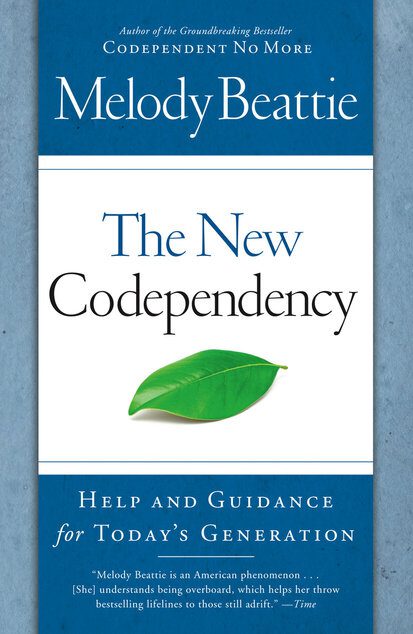
In The New Codependency: Help and Guidance for Today’s Generation, author Melody Beattie writes about what we think co-dependency is and what codependency actually is. She noted:
Some people call codependency a sign of the Me generation, another excuse for selfish people to continue putting themselves first. Some people believe (incorrectly) that recovering from codependency means they have to get a divorce. Or they’re afraid that codependency recovery behaviors will conflict with their religious beliefs. Others think detachment means becoming cold and uncaring. Those are misconceptions that don’t come close to what being healthy and functional means.
There’s a difference between loving someone and being trapped in a miserable marriage. There’s a difference between giving to get someone to like us, which leaves us resentful, and giving from heartfelt generosity. There’s a difference between enabling someone to drink and nurturing people we love, between narcissism and self-love, and between self-centeredness and staying centered in ourselves.
All codependent behaviors make sense if traced to their origins. The behaviors associated with codependency—from controlling to caretaking—are behaviors that saved our lives when we didn’t know what else to do. In most situations, whether alcoholism was involved or not, codependent behaviors are what anyone might do if he or she had walked for five or ten years in our shoes.
Codependency is normal behavior, plus. There are times we do too much, care too much, feel too little, or overly engage. We forget where the other person’s responsibilities begin and our responsibilities stop. Or we get busy and have so much to do that we neglect ourselves.
Codependents may be smothering, clinging, and needy (they kill us with kindness and try to please us until we can’t stand them). But on the brighter side, once they work through these issues, they can become outstanding people. Many use
All codependent behaviors make sense if traced to their origins.
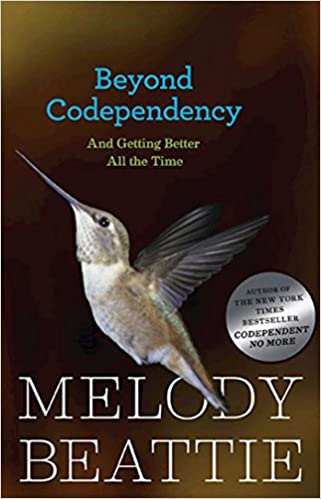
In her book, Beyond Codependency: And Getting Better All the Time, Melody Beattie writes:
Codependency is a self-defeating cycle. Codependent feelings lead to self-neglect, self-neglect leads to more codependent feelings and behaviors, leading to more self-neglect, and around we go. Recovery is a more energizing cycle. Self-care leads to better feelings, healthier feelings lead to more self-care, and around that track we travel.
On Self-Care (The New Codependency)
Just as we’re instructed in an airplane (in the event of low cabin pressure) to put on our oxygen mask first before helping others, we know that taking care of ourselves helps us love people better. Taking care of ourselves isn’t selfish—unless we cross the line and don’t care about others at all. That’s as unhealthy as helping too much.
Taking care of ourselves can’t be reduced to a list of rules. Don’t let anyone tell you it can. Self-care is a constantly changing, evolving art. It requires awareness, presence, self-love, and authentic interaction each moment with Life. We have common problems: a chemically dependent child; an alcoholic parent; a series of disastrous relationships; betrayal by people we trust; exhaustion from taking care of a sick or dying parent or spouse.
But we’re each unique. The basic self-care behaviors are the same, but exactly how and when to apply them can be different, depending on each situation. Exactly what you need to do to take care of yourself is your decision. You’re the guru. Your answers are between you and your Higher Power.
No two moments in time are alike. Neither are any two people.
The Knowing-Doing Gap – The New Codependency (2009):
Information is essential. Change is experiential.
Reading about a problem is like reading a travel guide. We find suggestions about what to see, what to avoid, and other tips. But reading the book is different from taking the trip. That’s also how it is with growth. Information is essential. Change is experiential.
We can have stacks of information about setting boundaries, but it still takes those confusing, hurtful situations to help us understand our limits. Reading encyclopedias about caretaking and control won’t substitute for a drug-addicted son or an alcoholic wife teaching us about surrendering or letting go.
We don’t learn about taking care of ourselves the way we learn math. Although the information is useful and sometimes critical, self-care isn’t only an intellectual process. It’s our experiences that change us.
Reading about a problem is like reading a travel guide. We find suggestions about what to see, what to avoid, and other tips. But reading the book is different from taking the trip.
Self-Care
I’ve learned that self-care isn’t narcissistic or indulgent. Self-care is the one thing I can do that most helps me and others too. – Melody Beattie, Beyond Codependency
Codependency isn’t minor. The problems from it can progress, become fatal, or cause relapse unless we address those issues. It’s common for codependents to medicate emotions. Codependency hurts. Again, it’s about crossing lines. When we cross the line from social or problem drinking, or pseudoaddiction into true alcoholism and addiction, alcoholism becomes a primary problem of its own. But at some time to continue our healing, we need to address the issues underneath.
Learn to say the hard stuff and the easy stuff. Before long, all of it will be the same: We’ll be expressing our Truth, who we are, and what we honestly have to say.
Codependent Fatality
Untreated chemical dependency results in incarceration, early death, or insanity. Or it results in long, miserable lives. Recovery is a life-or-death issue. Codependency is equally fatal. Codependency issues either cause us to be among the living dead or choke the life out of us tortuously, slowly. Many of us are so busy looking at the other person, we’re not even aware we’re dying.
Often we learn the best when we don’t know we’re learning.
The same idea applies to any situation where we think we’re stuck. The rule of thumb when we keep getting pulled back into something— relationship, job, or situation—after we think it’s over is: Sometimes we learn the most important part of the lesson after we think class has ended. Stay present. Class isn’t over until it’s finished!
I have learned a lot from reading Melody Beattie’s books, I have learned a lot about the pervasiveness of codependency in our relationships, addiction, shame, dealing with family dysfunction, getting help, vulnerability, becoming pro dependent, self-care, setting healthy boundaries, and getting better.
All the Best in your quest to get Better. Don’t Settle: Live with Passion.

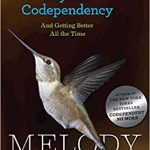
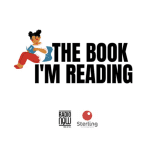
1 Comment
Thanks for writing this. I bet her books will be helpful.